© 2023 M. José Sánchez
© 2023 Urantia Association of Spain
¶ David versus Goliath
With autumn already here in Spain, we welcome you to this new issue of the Luz y Vida newsletter of the Urantia Association of Spain. New reflections, discoveries, study materials, video recommendations, activity reviews, etc., await you every month in this digital magazine that we offer you so that you can enjoy it at home. And what can you find in this November issue?
Works as interesting as:
- A presentation by Javier Martínez about the personal transformation that occurs when reading The Urantia Book.
- Another work on whether the crucifixion was really necessary.
- A presentation on Anova as a world of Nebadon in the seventh stage of light and life.
- An analysis by Mariano Pérez on meditation, prayer and worship.
In addition to our fixed sections of “Chronicle of the life of Jesus”, “Guide to The Urantia Book for children”, “Urantian questionnaire” answered by Fernando Carazo, “My favorite paragraph” written by José Manuel Díaz, Zoom presentations for the month of November or “Navigating through life.”
As you can see, it is a very interesting, varied and “nutritious” number for those of us who read and delve deeper into The Urantia Book.
Let’s begin together this new journey through The Urantia Book in this month that begins. Join us on this trip through the book and its fascinating nuances. Join our reflections and the attempt to expand the minds and, above all, the hearts of the readers of The Urantia Book.
“Jesus had many visits with a Chinese merchant. In saying good-bye, he admonished him: “Worship only God, who is your true spirit ancestor. Remember that the Father’s spirit ever lives within you and always points your soul-direction heavenward. If you follow the unconscious leadings of this immortal spirit, you are certain to continue on in the uplifted way of finding God. And when you do attain the Father in heaven, it will be because by seeking him you have become more and more like him. And so farewell, Chang, but only for a season, for we shall meet again in the worlds of light where the Father of spirit souls has provided many delightful stopping-places for those who are Paradise-bound.”” (UB 133:4.9)
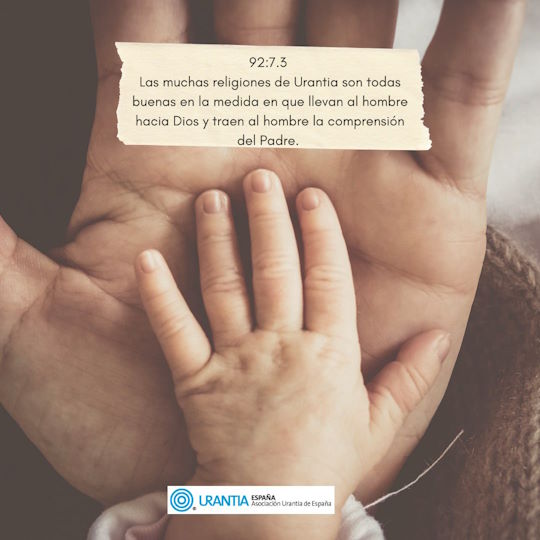
Jesus had many conversations with a Chinese merchant and said goodbye to him like this. This quote is a challenging example for those who only conceive of his Truth as the only valid one. Could a Chinese merchant, who did not follow the laws of Moses, be saved just like a Jew? Well, that’s right, since Jesus tells him that they will see each other on the mansion worlds in the future. In the same Urantia Book, an entire chapter is dedicated to different religions and philosophies prior to Christianity, because:
The many religions of Urantia are all good to the extent that they bring man to God and bring the realization of the Father to man. It is a fallacy for any group of religionists to conceive of their creed as The Truth; such attitudes bespeak more of theological arrogance than of certainty of faith. There is not a Urantia religion that could not profitably study and assimilate the best of the truths contained in every other faith, for all contain truth. Religionists would do better to borrow the best in their neighbors’ living spiritual faith rather than to denounce the worst in their lingering superstitions and outworn rituals. (UB 92:7.3)
This honest work of seeing and valuing “the best” of other religions or ways of thinking was what Jesus always did with those he met. Once he did it, however, it linked with his message of salvation. For example, let’s look at this simple and brief example:
To the Epicurean master he said: "You do well to choose the best and appreciate the good, but are you wise when you are not able to perceive higher elements of mortal life that are embodied in the realms of the spirit derived from the recognition of the presence of God in the human heart? UB 133:4.5
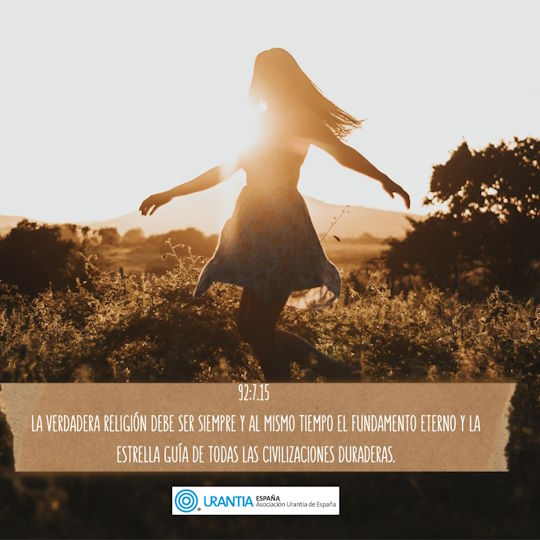
How many conflicts would be resolved if we valued “the best” of other ways of thinking or other religions… especially when religion can be the great inspiration to develop a new and renewed civilization.
The book talks about a precious key to the progress of our planet: people who, from different religions, respect and accept each other for what they all have in common: God, the Eternal Father of all human beings. Brothers who are different, but who make up the same family.
Religious peace—brotherhood—can never exist unless all religions are willing to completely divest themselves of all ecclesiastical authority and fully renounce all concept of spiritual sovereignty. God alone is sovereign in the spirit. There can be no equality among religions (religious liberty) without religious wars unless all religions consent to transfer all religious sovereignty to some superhuman level, to God himself. 134:4.4-5 (1487.1-2)
However, the harsh reality of our planet is confrontation, conflicts and wars.
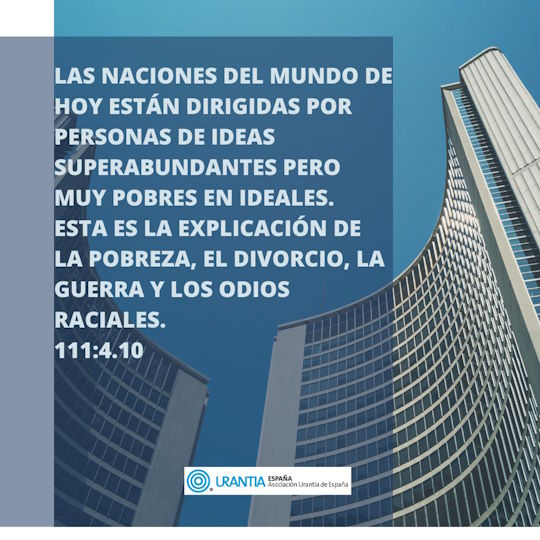
Society is not fair and needs to be changed. Haven’t you thought about it more than once? Other laws, another economy, other international relations are necessary. But time leads us to realize that, despite our achievements and constant struggles, the world continues to be unfair. You may be disappointed and consider that everything you have done has been a great failure, because you have not achieved the desired goal. In the face of terrible Goliaths, what can little David do? What can we, the readers of The Urantia Book, offer to this issue?
When we feel incapable of changing the world and others, we only have one constructive option left: changing yourself. The surprise that awaits you is that if you change, everything changes. It is not words that transform others, but examples. Great ideas are transmitted from heart to heart, not through campaigns or great speeches. Your change transforms others, the world, its laws and its economy, because everything good and bad is born from the human heart.
The Sufi Bayazid says about himself: “As a young man I was a revolutionary and my prayer consisted of saying to God: ‘Lord, give me the strength to change the world.’” “As I grew up and realized that I had spent half my life without managing to change a single soul, I transformed my prayer and began to say: ‘Lord, give me the grace to transform everyone who comes into contact with me. Even if it is only my family and friends. With that I am satisfied.’”
»Now that I am old and my days are numbered, I have begun to realize how stupid I have been. My only prayer is this: ‘Lord, give me the grace to change myself.’ If I had prayed this way from the beginning, I would not have wasted my life.»
Everyone thinks about changing humanity. Almost no one thinks about changing themselves.
(Anthony de Mello)
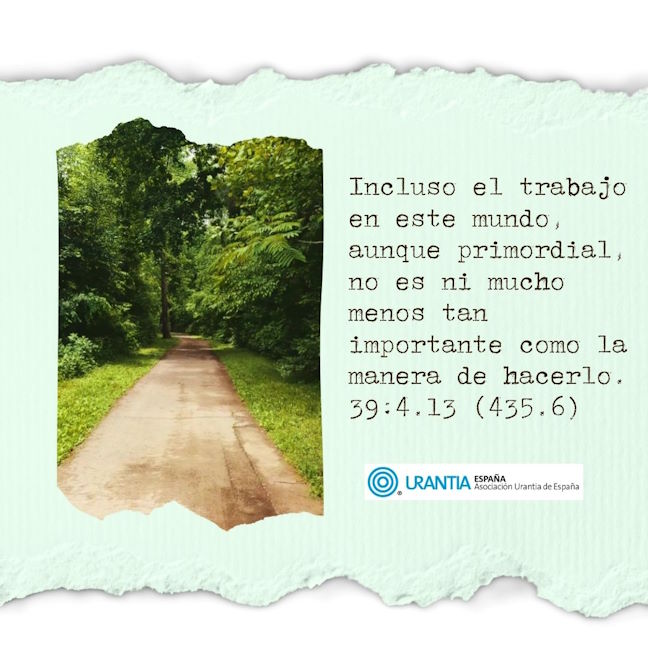
Readers of The Urantia Book can offer that alternative: the change of consciousness, the expansion of our mind and our heart, outside of tribes, nations, religions, economic groups, hidden interests, etc., which are limiting and involutive. The personal religion that is advocated in the book, that growing intimacy with our Father, is changing our lives and broadening our vital horizon, going beyond appearances and finding another way of seeing reality. A way of seeing that looks at reality from a wonderful height. This form of religion does not require extra time because it does not need places or schedules to be practiced, because it is a way of life and a technique of thinking, an attitude that accompanies us at home or at work.
There is a simple text that highlights the value of our attitude towards life. Do you know the parable of the blessings in disguise? This wonderful story goes like this:
A man had a very beautiful horse, so special that even the emperors wanted to buy it at any price, but he refused. Then, one morning he discovered that his horse had been stolen. The entire town gathered around him to show their condolences and said to him:
—What a shame! You could have made a fortune. They were offering you a lot of money, but you have been stubborn and stupid, and now your horse has been stolen.
But the old man laughed and said:
—Don’t talk nonsense. The only thing that is certain is that the horse is no longer in the stable. Let’s let the future come and we’ll see what it has in store for us.
In fifteen days the horse returned, and he did not return alone, he brought with him a dozen wild horses from the forest. The whole town gathered and said:
—The old man was right! His horse has returned bringing with him twelve magnificent horses. Now he can earn all the money he wants.
They went before the man and said to him:
—We’re sorry we couldn’t understand the future and the ways of the Lord, but you’re great! You knew what was going to happen, you can glimpse the future.
“—Nonsense!” said the old man. “All I know is that the horse has returned with twelve others, but no one knows what will happen tomorrow.”
And the next day it happened that, while the old man’s son was trying to tame one of the horses, he fell and broke his legs. The whole town gathered together again and said:
—You were right, you never know what’s going to happen; the horse’s return turned out to be a curse, it would have been better if it hadn’t come back. Now your son will be paralyzed for the rest of his life.
“Don’t jump to conclusions,” said the old man. “Wait and see what happens. The only thing we know for sure is that my son has broken his legs, that’s all.”
It happened that fifteen days later the young people of the town were called up by the government because their country was going to go to war. Only the old man’s son remained because he would not be useful in the battle. They all gathered together and said:
—Our children are gone! At least you have your son with you. He may be paralyzed, but at least he’s here! We won’t have anyone to take care of us when we get older, and you at least have a son who can still be cured.
“You can only say that your sons have been called up,” the old man replied. “My son has stayed, but we cannot conclude anything.”
Simply state what happened, do not “interpret” the inevitabilities of life. We have to live with them. We cannot escape pain, suffering, failures, because life’s challenges allow us to grow. Accept them. They are “blessings in disguise” if we look from a higher horizon, if we observe the problems with the proper perspective. It is about seeing life not as the mixed and confused threads of the back weft of the embroidery, but as the beauty of the embroidery on the front side.
Let us trust in Life: it is our ally, our friend.
Let us open our minds to our Being, that internal light that always accompanies us.
Let us persevere, because we can assume that trust and commitment every day in our daily activities, moment by moment, meeting after meeting.
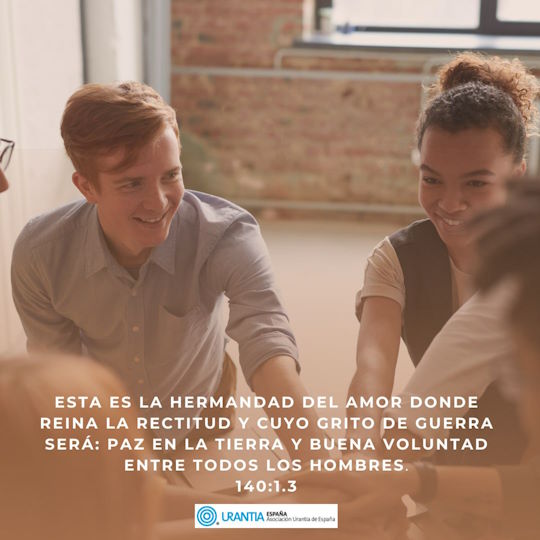
Let us follow the example of the Master who, as Saint John of the Cross poetically wrote a few centuries ago, “pouring out a thousand thanks, he passed through these thickets with ease.” He poured out a “thousand thanks” in a small area of the planet marked by wars, and his followers can continue to pour out a “thousand thanks,” despite everything.
The power of this kingdom will consist neither in the strength of armies nor in the might of riches, but rather in the glory of the divine spirit who will come to instruct the minds and rule the hearts of the born-again citizens of this heavenly kingdom, the children of God. This is the brotherhood of love where righteousness reigns and whose battle cry will be: Peace on earth and good will among all men. UB 140:1.3
Let us trust then in the change of our planet, in the transforming power of the little Davids. Let us trust in ourselves.
¶ References
- Index of the magazine “Luz y Vida” of the Association of Spain
- This article from the magazine “Luz y Vida Online”